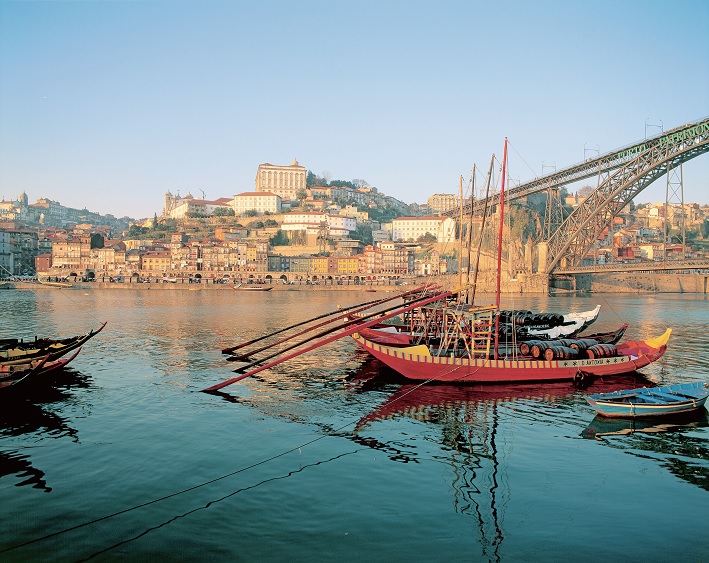葡萄牙 – 經濟改革見成效
葡萄牙 – 經濟改革見成效
Portugal concluded with remarkable success in major structural reforms
Geographically located in Europe’s West Coast, on the Iberian Peninsula, Portugal is one of the oldest countries in the world, with nearly 900 years of history, which is a remarkable demonstration of its endurance and ability to handle challenges and adversities.
The Republic of Portugal is a Parliamentary modern democracy, where the various state institutions and civil society work in a coordinated and stable fashion, contributing to the establishment of a good business climate.
Portugal is a member of the European Union since 1986, and on 1995 started to implement Schengen Area rules. In 1996 it was a co-founder of the Community of Portuguese Language Countries (CPLP) headquartered in Lisbon.
The Portuguese language is spoken by more than 250 million people spread over all continents: Europe, Africa, America and Asia. This diversity greatly contributes to the strong historical and cultural ties that Portugal has with the world.

Gare do Oriente
In 2014, Portugal concluded with remarkable success, a very demanding economic adjustment program. Since 2011, the structural imbalances were corrected and Portugal has recorded a surplus in its external balance and has been reducing the fiscal deficit. To improve competitiveness, major structural reforms were implemented, namely in the labor market, in regulated markets and in taxes on corporate income. In addition, Portugal implemented a privatization program that has been very successful.
The economic adjustment programme required enormous sacrifices to the Portuguese people, and, particularly, to the business community. However, the companies reacted tremendously well, overcoming the challenges, reinventing themselves and conquering new markets.
Nowadays, the economic recession is over, unemployment is declining at a healthy pace, and external competitiveness was restored at surprising speed. It is safe to say that the most painful part of the road to economic recovery was overcome. As a result, this economic adjustment process revealed and amplified important attractiveness factors of our economy. Some important lessons were learned, and now we trust we are much more prepared to anticipate and react in a flexible way to a future crisis.
The Portuguese service sector plays a major role in our economy. In the 2nd quarter 2015, it represented 76.7% of GVA (gross value added) and employed 67.8% of the population. In the last decade, there was a significant change in the country´s manufacturing industry, with the development and growth of new high-technological sectors, such as the automotive and components, electronics, energy, pharmaceutics and industries related to new technologies of information and telecommunications. Regarding the changes within the services sector, it is important to highlight the growing importance of tourism, benefiting from Portugal’s geographical position, its Mediterranean climate, moderated by the influence of the Atlantic and its extensive coastline.

Porto, Ribeira Photo by João Paulo
In 2015, Portugal´s main exports were machinery and tools (14.6% of the total), vehicles and other transport material (11.4%), mineral fuels (7.7%), base metals (7.6%) and plastics and rubber (7.4%). These five main product groups represent almost half of the total exported by Portugal in that period.
Our main markets are the European Union countries, responsible for over 70% of our total sales abroad, with Spain, France, Germany, United Kingdom and the USA, accounting for 60% of total exports in 2015.
Regarding the imports of goods, machinery and tools, mineral fuels, vehicles and other transport material, chemicals and agricultural products, represent 62.7% of the total. The European Union was the origin of the majority of imported products over this period (76.4% of the total).
In 2015, Hong Kong was the 4th destination of Portuguese exports to Asia. The Special Administrative Region, with only 0.5 % of the total population of China, captures up about 13 % of Portuguese exports of goods to China as a whole. The main part of our exports to Hong Kong (around 60%) are of products with high and medium-high technological intensity, such as optical and precision instruments and machines and equipment.
Furthermore, at investment level, several Portuguese companies are present in the Hong Kong market. Simultaneously, Hong Kong large scale companies are discovering the Portuguese market, namely in the area of renewable energies. Recently, a consortium formed equally by Cheung Kong Infrastructure Holdings Limited (CKI) and Power Assets Holdings Limited (PAH), bought Portugal's wind-farm developer Iberwind. Iberwind has 31 wind farms with an installed capacity of about 700 megawatts, which accounts for about 15% of installed wind power capacity in Portugal.
Portugal is also an attractive destination for investment, offering unique competitive advantages:
1. Our geostrategic location, in the convergence of three continents (Europe, Africa and America) that legitimizes us as a prime business platform for the world.
2. Our participation in major economic blocs in the world, the European Union;
3. Our privileged relationships with the Portuguese Speaking Countries and the economic value of the Portuguese language, that enables business in Portuguese to thrive;
4. Our excellent infrastructures, including the Port of Sines, one of the largest deep water ports of Europe and focus of large foreign investment;
5. The skills and flexibility of our human resources, and a solid education system;
6. The quality of life in general , which combine fantastic weather , landscapes , culture and gastronomy, security, reduced pollution levels and unique conditions for living and working.
7. Our Golden Residence Permit Program is a fundamental tool to attract foreign investment, enabling visa waiver for entering Portugal and travelling within the Schengen area. PR of China is the main investor in Portugal under this system. This tool has been recently improved to better serve all its recipients.
Portugal has become, in recent years, one of the main destinations of Chinese investment in Europe, with a strong focus in the energy sector, financial services and health insurance, agro-food industry and real estate.
In 2015, Portugal and China celebrated 10 years of strategic partnership and the further strengthening of our economic relations is reinforced by the exceptional role of Portuguese companies and their processes of internationalization, which enables trilateral cooperation possible, in markets such as Africa, Europe and Latin America.
Lastly, the tourism industry in Portugal represents a significant share of the national product (about 10%). In global terms, Portugal ranks in 15th place among 144 countries in the global competitiveness ranking in Travel and Tourism of the World Economic Forum (2015), with particular good performance in the pillars of safety and security, tourism infrastructures, human resources, international openness, cultural resources and business trips. Other competitive factors are also important namely the hospitality and tolerance of the people, modern infrastructures, mild climate and the diversity and variety of the options. Moreover, it is important to emphasize the rich and varied universal net assets, with 15 sites classified as having World Heritage status.
Tourism revenue in Portugal has seen a sustainable growth during the period 2011-2015, having reached an annual average increase of 8.7%. The main markets clients, in 2015, were the United Kingdom (with 17.6% of the total), France (17.5%), Spain (12.7%), Germany (11%) and Angola (4.7%), that together made 63.5% of the total for this period.
According to the World Tourism Organization, in 2014, Portugal was the 27th world market (and 10th in the EU) in terms of tourism revenue and 36th market receiver. Portugal was considered the “Best Value Destination” by Lonely Planet in 2015, having the best quality/price ratio.
Remark: Article from Consulate General of Portugal in Macao and Hong Kong





